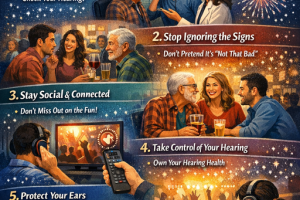Blog
Why Hearing Matters More Than You Think: Social Life, Loneliness & Memory Health When we think about hearing loss, most of us picture difficulty understanding conversations in noisy places …
New year, new you, new… ears? Well, maybe not entirely new ears, but definitely a fresh approach to taking care of the ones you’ve got! While everyone else is …
The holiday season brings joy, laughter, and celebration—but it also brings some surprisingly loud challenges for your ears. Between crackling fireplaces, bustling shopping malls, children’s excited squeals, and that …
When most people think of diabetes, they picture blood sugar, insulin, and maybe feet or eyes. But your ears? Yes—your hearing can also feel the effects of diabetes. According …
If you’re one of the millions of people worldwide experiencing tinnitus—that persistent ringing, buzzing, or humming in your ears—you know how challenging it can be to find relief. While …
1. Hearing Loss Isn’t Equal—Even at the Same Level People with similar audiogram results may still experience hearing challenges differently—especially in noisy environments. According to the Hearing Health Foundation, …
Or: How researchers discovered that the face holds the key to understanding that constant ringing in your ears* If you’ve ever experienced that persistent ringing, buzzing, or hissing in …
Bone anchored hearing instruments (BAHI) represent an innovative approach to hearing restoration for people with specific types of hearing loss. Unlike conventional hearing aids that amplify sound through the …
The Surprising Link Between Your Ears and Your Balance Recent research highlighted in McKnights reveals a startling statistic: individuals with hearing loss face a 51% higher risk of falling …
In recent years, the emergence of over-the-counter (OTC) hearing aids has promised greater accessibility and affordability for individuals experiencing hearing loss. While these devices may seem like an attractive …










